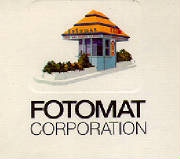 | |
| Company type | Subsidiary |
|---|---|
| Founded | 1965 in San Diego, California |
| Founder | Preston Fleet |
| Parent |
|
Fotomat was an American retail chain of photo development drive-through kiosks located primarily in shopping center parking lots. Fotomat Corporation was founded by Preston Fleet in San Diego, California, in the 1960s, with the first kiosk opening in Point Loma, California, in 1965. Fotomat became a public company in 1971 and was listed on the New York Stock Exchange (NYSE) in 1977. [1] At its peak around 1980, there were over 4,000 Fotomats throughout the United States, primarily in suburban areas. Fotomats were distinctive for their pyramid-shaped gold-colored roofs and signs with blue and red lettering. Usually positioned in a large parking area, such as a supermarket or strip mall, the Fotomat huts required a minimal amount of land and were able to accommodate cars driving up to drop off or pick up film. [2] Fotomat sold Kodak and Fotomat brand film, as well as other photography-related products, and offered overnight photo finishing. Many people assumed Fotomat was owned by Kodak, because of the yellow roofs and font similar to Kodak packaging. Fotomat also made filmstrips (35mm single frame) for school. When teachers wanted to have a custom captioned or sound filmstrip made, the teacher could use the Fotomat filmstrip development service, but teachers would have to take the pictures on blank 35mm single frame film and record the soundtrack on a cassette tape, then they would take them to the Fotomat booth, and the film and cassette tape would be sent to the Fotomat Lab to be produced.
Contents
Fotomat had both company-owned stores and franchises. This led to lawsuits between Fotomat and its franchisees over territories. [3] [4]
In the early 1980s, Fotomat Corporation was acquired by Konishiroku Photo Industry Ltd., also known as Konica Photo Imaging, in 1986. Eventually, it was sold to Viewpoint Corporation in 2002. [5] [6]
The company's main product, overnight film development, was rendered noncompetitive by the late 1980s development of the minilab, which provided one-hour photo development and could be installed on-site without a large capital investment. After the introduction of digital cameras, overnight service eventually became obsolete, and Fotomat switched to online digital imaging at Fotomat.com where users could edit and store their images. This site ceased operations on September 1, 2009. [7]
Many former Fotomat huts still exist, several having been converted into drive-thru coffee kiosks. [8] Competitors of Fotomat included Foto Hut, Fox Photo, and Kodak itself.
- A Fotomat kiosk in Massachusetts in 1987
- A former Fotomat kiosk, repainted and now selling cigarettes
- 35mm Fotomat brand film, 1980s


